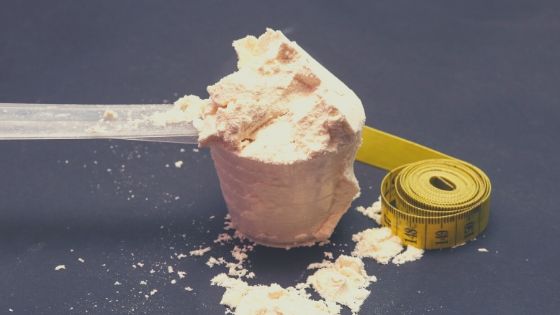As someone who eats predominantly a plant-based diet, I am a big fan of vegan powders to round out my diet. They help me meet my protein goals without having to eat a lot of extra calories.
As I’ve mentioned in other posts, I have never had problems with my vegan protein powder causing me an upset stomach.
Unfortunately, this hasn’t been the case for everyone I know.
There are some out there that have experienced stomach trouble after adding vegan protein powder to their diet.
It makes me wonder, what is the link between vegan protein powder and upset stomach? What are the possible causes as to why some people suffer and others don’t?
After doing some research I’ve come to the following conclusions.
There are basically 3 main causes why your protein supplement may be giving you an upset stomach.
- A lot of vegan protein powders are junk. They’re just bad for you.
- How you consume your protein powder may be making you feel bad.
- Misplaced blame. It might have nothing to do with your protein powder.
Let me explain.
3 Reasons Your Vegan Protein Powder May Be Giving You An Upset Stomach
Reason #1 – Poor Quality Vegan Powders

This, to me, is the number ONE reason why your vegan protein powder may be giving you an upset stomach. I’m going to give this subject a lot of attention.
The thing is, veganism has turned into a fad. It’s a great fad, don’t get me wrong. I want everyone to switch over to a plant-based diet.
But because it has become so popular, a lot of new products are on the market. Businesses of all kinds are looking to get a piece of the vegan pie, so to speak.
This means that a LOT of low quality, cheap products are available out there. Vegan protein powder is, unfortunately, one of them.
If you want a vegan protein powder that won’t upset your stomach, invest in a high-quality product
What Makes a Great Vegan Protein Powder?
The answer to this question depends on your own personal tastes.
Some really great quality protein powders are “naked” and have zero sweeteners or ingredients added for flavor. Unfortunately, if you want to mix it with water and drink it down, that can taste pretty awful.
There’s also the texture factor. Some powders are grittier than others.
Do you prefer something sweet, that mixes more like a chocolate shake? Obviously, you are not going to like the bare bones protein supplements.
No matter your preference, here are some general guidelines that I think you should stick to. These can help you decide if a certain vegan protein powder is high-quality or not.
Ask Yourself the Following Questions:
Is The Main Protein Source Soy?
Soy is pretty well-known for being a source of protein for vegetarians and vegans. But in recent years, science has made us take a long hard look at soy. More and more people are questioning if it is as healthy an option as was previously thought.
In my opinion, there is plenty of evidence that you should avoid soy as an ingredient in your protein powder.
Why? There are lots of reasons. Here are a few.
- Soy is a really common allergen. Lots of people get an upset stomach with soy because they are allergic and didn’t know it, or have an intolerance.
- Soy disrupts digestion. Soy contains trypsin inhibitors. Trypsin is an enzyme in your gut that helps digest… wait for it…. Protein. It doesn’t make sense to me to consume a protein powder that contains a component that inhibits the digestion of protein.
- Soy is the genetically modified crop most commonly cultivated in the world! It is grown with an incredible amount of herbicides, pesticides and chemical fertilizers.
- Soy affects the hormonal system in your body. Through compounds called phytoestrogens, soy can cause problems with your hormones. This can result in fertility problems and possibly cause cancer.
Ok, so maybe you don’t pay a lot of heed to the organic, non-GMO “hippy-dippy” reasons for avoiding soy. But the simple fact that it is known to cause digestive problems is reason enough to avoid it if your vegan protein powder is giving you an upset stomach.
What Kind Of Sweetener Does It Have?

If you want a great tasting sweet protein powder, you need to take extra care to read through that ingredient list. Sweeteners are a necessary ingredient for the flavored protein powders.
But not all sweeteners are created equal.
Artificial sweeteners are a common cause of an upset stomach. It might be best to avoid them altogether if you get stomach issues. By avoiding them, you avoid all of the problems they can potentially cause.
Problems associated with artificial sweeteners include:
- Digestive problems
- Altering your gut micro-bacteria
- Glucose intolerance
- Insulin Resistance
- Metabolic Dysregulation
So, what are the main artificial sweeteners that you want to avoid?
Keep your eye out for the following two ingredients:
- Sucralose
- Acesulfame Potassium
If you need to have sweetened protein powder, look for stevia or monk fruit extract, which is sometimes labeled as luo han guo. These are low-calorie NATURAL sweeteners.
Be careful though!
These sweeteners can have a taste that some people find off-putting. Because of this, they are often paired with maltodextrin or dextrose.
Those two ingredients are technically “natural” though highly processed. They are used to improve taste, texture, and sweetness.
Maltodextrin has been linked to serious stomach problems. It is known to cause cramping. It is also suspected to have a negative impact on gut bacteria. It is also linked to bowel irritation and gastroenteritis.
Some even suspect it has a role in the development of Crohn’s Disease!
Dextrose can also cause problems. It sometimes shows up on labels as dextrose anhydrous or anhydrous dextrose. While dextrose is not necessarily associated with stomach upset, it has been linked to weight gain, heart disease, diabetes, skin problems, and even depression.
If you are not accustomed to it and consume too much, it can cause you diarrhea and spiked blood sugars.
If you do not like stevia or monk fruit extract on their own, you might do best to find a vegan protein powder that has no added sweeteners.
You can always add a bit of fresh fruit, honey, or raw sugar to improve the taste.
What Kind Of Fillers Are In Your Protein Powder?
A lot of low-quality vegan protein powders cause upset stomachs because they contain fillers.
Fillers are ingredients that are added to improve texture and prevent caking. They also make you feel full longer.
Xantham gum, carrageenan, and cellulose are three very common fillers added to vegan protein powders.
These ingredients are not exactly ‘unnatural’ but they are not exactly healthy. And all of them can cause you to have an upset stomach.
- Carrageenan is a totally natural ingredient that is sometimes called “Irish Moss”. It’s actually a seaweed. This bad boy causes an upset stomach and bloat. It is also associated with irritable bowel syndrome and suspected to have a role in causing colon cancer! It is definitely worth avoiding.
- Xantham Gum is relatively safe, compared to the other options. The issue with this ingredient is that it can be made from various sources; wheat, corn or even dairy. If you have a food intolerance or gluten sensitivity, this ingredient could trigger an upset stomach and other associated symptoms.
- Cellulose is made from wood pulp and cotton. Really. I’m not making this stuff up. (OK, it naturally occurs in most fruits and veggies as well, but I’m talking about the processed additive version of the stuff). It’s considered safe as a food additive and shows up everywhere in processed food! It is also known to cause bloating, excessive gas and loose stools, aka, upset stomach. Avoid this stuff!
High-quality vegan protein powders should avoid all of the ingredients that I’ve listed above.
Vivo Life protein powder, for example, is a high-quality protein powder that doesn’t have all the crap in but tastes great.
I highly recommend that you look for a certified organic and non-GMO certified product that comes in a resealable bag to avoid further contamination from BPA plastic particles and pesticide residues.
Check out this list of my best organic and GMO-free plant-based protein powders if you want to know which is a good option.
Vegan protein powder should not be causing you an upset stomach if it is made from basic, minimally processed ingredients.
Reason #2 – How You Consume Vegan Protein Powder

You could have the highest quality supplement on the market, but everybody is different.
Your body may react differently to the same product that causes zero issues for someone else.
You might need to experiment a bit to find the best way to work it into your diet and avoid any digestive upset.
Think about how and when you consume your vegan protein powder.
Do you take it pre or post-workout? As a meal replacement? As an addition to baked goods? This might have something to do with why you get an upset stomach.
There is a lot of conflicting advice out there. To me, means that each person needs to find what works best for them.
Here are some tips that may help you work vegan protein powder into your diet and avoid upset stomach:
- Protein needs to be consumed throughout the day. No matter what your daily protein goals are, it’s a good idea to get a bit of protein in every meal. Avoid high doses of protein at any one time.
- Balance each meal with fiber, fats, and carbohydrates. If your vegan protein powder is giving you an upset stomach, maybe using it as a meal replacement is not the best option. As vegans, in general, we have to be really careful to eat well-balanced meals to avoid digestive discomfort.
- Pre or Post-workout meals might be the problem. If you are plagued by an upset stomach after every workout, try changing up when you eat. It might be a good idea to wait a little longer post-workout for your protein boost. Alternatively, it might be a good idea to hold off on working out for a little longer after a meal.
New studies confirm that when you consume protein in relation to your workout doesn’t have that much of an effect on muscle growth or recovery.
- Mix your vegan protein powder into other foods. There are so many great recipes online that incorporate flavored and unflavored protein powder into them. Get creative and think beyond the shake.
This is not a definitive list, by any means. My point here is that your upset stomach might have more to do with how you are consuming the protein powder rather than what is in it.
Be observant of your body and your habits. Simple changes might make a big difference.
Reason #3 – Your Protein Powder May Have Nothing to Do With It
OK, I’ll admit. This is not really a true reason why your vegan protein powder is giving you an upset stomach.
But it’s worth considering.
Have you tried every protein powder under the sun, including the bare-bones limited ingredient options? Do they all seem to give you an upset stomach?
If so, it might be a good idea to take a good hard look at the rest of your diet and your state of health in general.
There are a number of causes that may be at the root of your upset stomach that have nothing to do with your protein powder.
You may be suffering from undiagnosed:
- Food allergies or intolerances
- Stomach ulcers
- Gastritis
- Stress and Anxiety
- Celiac Disease
- Irritable Bowel Syndrome
- Hernia
- Tumor
- Side effects from other medications
Even if your upset stomach seems to be directly related to consuming protein powder, it may not be. Different ingredients may be causing a reaction because of an underlying health issue.
If you have tried different products and changes to your lifestyle yet nothing seems to help alleviate that upset stomach, it might be time to make an appointment with your MD.

3 comments
Thank you so much
You’re welcome!
It’s awesome. thanks for providing such a good content. I am surely a plant mama.